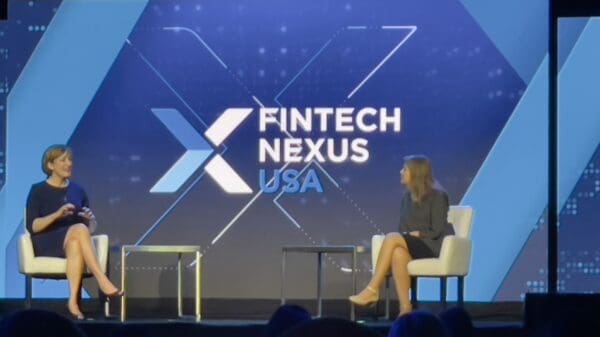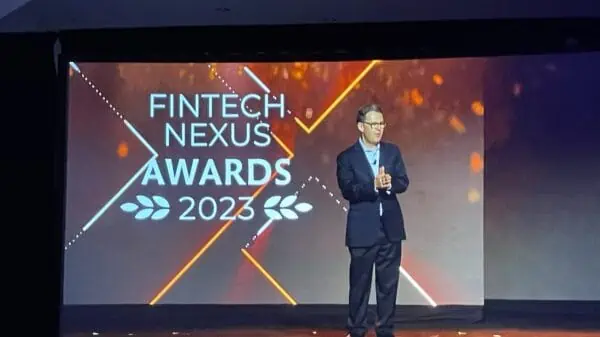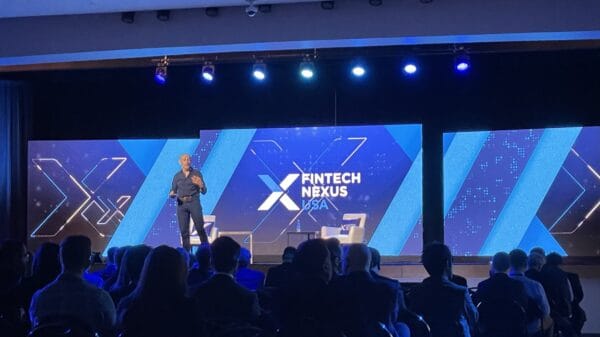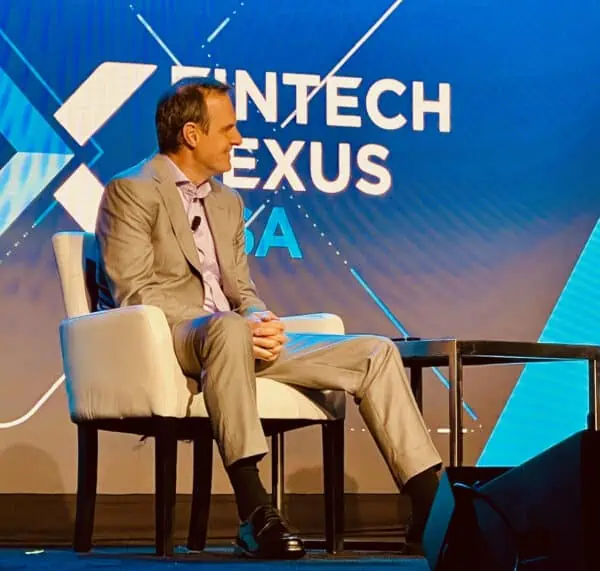
It was a warm week in New York City, and I found myself flying across the country to attend the preeminent fintech conference Fintech Nexus, previously known as LendIt Fintech. At the heels of a global pandemic, the recovering U.S. economy, and continuing regional banking crisis, we find ourselves converging again with an industrial-sized group hug.
Rising interest rates, stubborn inflation, and the encroachment of AI were topics of discussion at Fintech Nexus. We find ourselves at a crossroads again, and the industry must find its footing to reinvent itself.
The keynote speakers this year are akin to the oracles of finance and technology. Attendees are trying to find a direction of where we’re headed, who we want to be, and the Fintech endgame.

Generative Pre-Trained Transformers, More Than Meets The Eye.
Goldman Sachs’ new-ish Chief Information Officer Marco Argenti took the stage and answered some tough questions about GPT or generative pre-trained transformer, a type of large language model that seems to be a new planet-killing death star to some.
Mr. Marco said that these language models are becoming the biggest experts in the world. You can ask it for anything. Imagine a genie in the bottle without the three-question restraints.
He said the GPT models are ultimately a productivity booster and may take a while to replace jobs, as many of us have feared. He suggested that some of his developers or software engineers could experience a 10-30% productivity boost, and this super humanization can increase workers’ output by up to 20% across Goldman’s entire organization.
AI and GPT can enable us to conduct thought experiments and integrate humanity at a faster pace. The flip side of his comment tells us that we probably need 30% fewer people around to do the work of our current workforce, but this new knowledge well will help us evolve into a superior race and discover new wonders that we previously could have imagined.
AI will fuel knowledge digitization (training large language models based on trillions of parameters) and knowledge extraction (prompting this new digital expert for dots that were previously unconnected).

Fintech Investor Extraordinaire’s New Crystal Ball
If you are Nigel Morris, co-founder of QED investors, you have to pick up your toys and find a new sandbox. That’s exactly what he’s predicting in his new report written with Boston Consulting Group. The narrative is that the Fintech industry is projected to be a $1.5 trillion dollar industry by 2030.
The research further asserts that Fintech only represents about 2% of the current $12.5 trillion dollar financial services revenue. The research paper mixes revenue numbers and valuation numbers; it’s all bit convoluted. However, we must believe in the best betting man we have in our industry.
Speaking of valuation, that’s where the rubber meets the road. Valuations of Fintech companies have substantially dropped over the years, and the phrases like “flight to quality” have been thrown around the conference grounds quite a bit. Everyone that’s raised any amount of money recently is a bit shy about sharing their latest valuation numbers based on their last funding round, which is understandable.
The yesteryears of 20x multiple of fill-in-the-blank are long gone, and we must focus on the cost of customer acquisition, unit economics, etcetera.
All that means is that outsized investments based on waiting lists are long gone, and no one is willing to put up the first dollar on yet another lending, credit card, or payments company that has no real product differentiation, cheap money, great underwriting, or low-cost customer acquisition.
However, the bright spots are still clearly visible. The surviving players of the current Fintech landscape are loved by their customers. SoFi, NuBank, OnDeck, Affirm, and the Lending Clubs of the world are all getting this high musical NPS score or Net Promoter Score.
For existing players to thrive again, they must grow extra appendages such as AI, Open API, Decentralized Ledgers, Embedded IoT (Internet of Things), and quantum computing, which gets mentioned in Nigel’s slides.
He surmises that for Fintech to grow again, anything analog and high friction must be digitized all the way through. However, last miles issues are always hard to solve.
So, where is he moving his chips?
APAC (Asia), Middle East, and Africa, and his crown jewel, Latin America. Nubank of Brazil has been the loudest success story to date for Nigel, and it shows.
Nigel is on the prowl again to discover the next NuBank, which he predicts will emerge from Africa. For us in the audience, we are left with a meager 4x growth trajectory in North America, but we will make Nigel proud and stay nimble and innovative because he’s right. We are still at the beginning of this digitizing our economy.

A Year of Bank Busting
This year has been a year of banking failures. I’ve made these statements before in conversations that these bank failures are a product of the Fed’s monetary policies. When the Fed artificially inflates and deflates the worth of our money, casualties abound. Unfortunately, we had to say goodbye to many of our favorite banks in our Fintech community.
The latest slew of congressional hearings by our politicians are theatrical and blame the bank’s management teams, the speed of our money-transferring technology, and worse, lobbyist and their attempts to loosen up the noose around the bank’s necks. When our leaders don’t own up to the consequences of their actions, I fear the worst.
The former CEO of Silicon Valley Bank, in his latest exchange with the Senate Banking Committee, basically boiled it down to the fact that the Fed said the inflationary pressure and the rise in interest rates were “transitory,” predicting that inflation will calm down precipitously. This simply did not happen. Inflation is still at an all-time high, and the Fed is still using 100-year-old tools to fix an interconnected global economy.
If anyone hears the word “transitory”, any self-respecting CEO of a bank won’t move the dial or tighten their belts or overreact. It was all supposed to blow over in a few quarters. But now they have lost their jobs based on a bad call from the Fed.
That said, why would any Fintech become a bank? No one in their right mind will do that. SoFi and LendingClub acquired banking charters because they wanted to lower their cost of capital when the times were good.
Upgrade CEO Renaud Laplanche was very clear on stage that Upgrade will work with the banks but never wants to become a federally chartered bank. His business model is to create innovative products to attract consumers for their 200 affiliates bank partners. Their new focus is to create a hybrid credit and debit card to provide flexibility for consumers to pay certain transactions over time and debit from their checking accounts normally as a debit card.
However, when the CNBC reporter Hugh Son tossed him a valuation question around his last $6 billion-plus valuation funding round, Renaud was a bit evasive. I would dodge the question as well.
The Show Must Go On
This year’s crowd at Fintech Nexus was enthusiastic. Some survived rounds of layoffs, and some pivoted their businesses to stay afloat. A ton of service providers, SaaS platforms, and infrastructure plays abound. At times it feels like we are waiting for another deluge to replenish the gold-laden rivers of Fintech, and shops that sell buckets and shovels are still in town hoping money will rush back in again, which it will, but where and when is a big question we still don’t have an answer to yet.
Until next time, Fintech Forever.

Timothy Li, Senior Contributor at Crowdfund Insider. Li is the Founder of Kuber, MaxDecisions, and Alchemy. A serial entrepreneur, Li has over 15 years of Fintech industry experience. He’s passionate about changing the finance and banking landscape. Kuber launched Fluid, a credit-building product designed for college students to borrow up to $500 interest-free. Kuber’s 2nd product Mobilend is a debt consolidation product aiming to lower debt for all Americans. Alchemy, a state-of-the-art end-to-end white-labeled lending platform, was acquired in 2022. Li also teaches at the University of Southern California School of Engineering.

